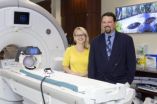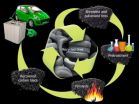(Press-News.org) DURHAM, N.C. -- The removal of institutions or group homes will not lead to better child well-being and could even worsen outcomes for some orphaned and separated children, according to new findings from a three-year study across five low- and middle-income countries.
Children in institutions are as healthy and, in some ways, healthier than those in family-based care, according to the study, which was led by Kathryn Whetten, a Duke professor of public policy and director of the Center for Health Policy and Inequalities Research (CHPIR).
In the largest and most geographically and culturally diverse study of its kind, Duke researchers found there is great variation in how much children's well-being improves over time. The type of residential setting, either institution- or family-dwelling, was a poor predictor of change.
The study found that stronger predictors of child well-being were country, neighborhood or community, and differences in psychosocial characteristics such as age, gender, baseline emotional and nutritional status, and life course events.
Researchers also found that children in group homes were more likely to have their basic needs met.
The Positive Outcomes for Orphans (POFO) study based at the Duke Global Health Institute is following more than 1,300 orphaned and separated children living in institutions and another 1,400 children in family-based care. This sub-study includes three years of data from caregivers and children aged 6-15 across study sites in Cambodia, Ethiopia, India, Kenya and Tanzania.
Researchers examined many aspects of child well-being, including physical health, emotional difficulties, growth, learning ability and memory.
With more than 2 million children living in institutions worldwide, this research challenges views held by children's rights organizations that institution-based caregiving results in universal negative effects on the development and well-being of children.
"Our findings put less significance on the residential setting as a means to account for either positive or negative child well-being over time, " Whetten said. "This underscores the need to continue working to tease out the blend of caregiving characteristics that lead to the best child outcomes within each setting."
"We believe returning children from institutions to biological families may not result in the best outcomes, at least without significant intervention for the biological family, including supervision and follow-up," Whetten said.
Ultimately, Whetten believes the evidence suggests a need to "focus on improving the quality of caregiving in family settings and group homes, the well-being of caregivers and improving communities."
INFORMATION:
The study, which appears Aug. 29 in Plos One, was funded by Eunice Kennedy Shriver National Institute of Child Health and Human Development (5R01HD046345).
Other CHPIR researchers involved in the study include Jan Ostermann, Brian Pence, Rachel Whetten, Lynne Messer, Sumedha Ariely, Karen O'Donnell, Augustine Wasonga, Vanroth Vann, Dafrosa Itemba, Misganaw Eticha, Ira Madan and Nathan Thielman. The study was supported by funding from the National Institute of Child Health and Development.
CITATION: "Three-year change in the wellbeing of orphaned and separated children in institutional and family-based care settings in five low- and middle-income countries." Whetten K, et al and The Positive Outcomes for Orphans (POFO) Research Team. PLOS ONE, Aug. 29, 2014.
Orphaned children can do just as well in institutions
Drive to eliminate institutional care not supported by evidence
2014-08-27
ELSE PRESS RELEASES FROM THIS DATE:
Self-deceived individuals deceive others better
2014-08-27
Over confident people can fool others into believing they are more talented than they actually are, a study has found.
These 'self-deceived' individuals could be more likely to get promotions and reach influential positions in banks and other organisations. And these people are more likely to overestimate other people's abilities and take greater risks, possibly creating problems for their organisations.
The study by researchers from Newcastle University and the University of Exeter, has also found that those who are under confident in their own abilities are viewed ...
Brain networks 'hyper-connected' in young adults who had depression
2014-08-27
Depression may be better predicted and understood now that University of Illinois at Chicago researchers have discovered that young adults who previously experienced the mental illness have hyper-connected emotional and cognitive networks in the brain.
UIC researchers used functional magnetic resonance imaging to examine the brain connectivity of young adults ages 18 to 23 while they were in a resting state. Thirty unmedicated young adults who had previously experienced depression and 23 healthy controls were used in the study, which has been published online in the journal ...
Malaria symptoms fade on repeat infections due to loss of immune cells, UCSF-led team says
2014-08-27
Children who repeatedly become infected with malaria often experience no clinical symptoms with these subsequent infections, and a team led by UC San Francisco researchers has discovered that this might be due at least in part to a depletion of specific types of immune cells.
Working in Uganda, one of the most malaria-plagued nations in Africa and one in which individuals are repeatedly exposed to the malaria parasite, UCSF scientists found that a depletion of immune cells known as gamma delta T cells diminishes inflammatory responses in infected children — responses ...
Tracking spending among the commercially insured
2014-08-27
LEBANON, NH – Recent growth in health care spending for commercially insured individuals is due primarily to increases in prices for medical services, rather than increased use, according to a new study led by researchers at The Dartmouth Institute for Health Policy & Clinical Practice, published in the August issue of the American Journal of Managed Care.
There is increasing concern that consolidation in the health care marketplace will lead to increased prices faced by payers and, ultimately, consumers," said Carrie Colla, PhD, assistant professor at The Dartmouth ...
Encyclopedia of how genomes function gets much bigger
2014-08-27
A big step in understanding the mysteries of the human genome was unveiled today in the form of three analyses that provide the most detailed comparison yet of how the genomes of the fruit fly, roundworm, and human function.
The research, appearing August 28 in in the journal Nature, compares how the information encoded in the three species' genomes is "read out," and how their DNA and proteins are organized into chromosomes.
The results add billions of entries to a publicly available archive of functional genomic data. Scientists can use this resource to discover ...
Rubber meets the road with new ORNL carbon, battery technologies
2014-08-27
OAK RIDGE, Tenn., Aug. 27, 2014 – Recycled tires could see new life in lithium-ion batteries that provide power to plug-in electric vehicles and store energy produced by wind and solar, say researchers at the Department of Energy's Oak Ridge National Laboratory.
By modifying the microstructural characteristics of carbon black, a substance recovered from discarded tires, a team led by Parans Paranthaman and Amit Naskar is developing a better anode for lithium-ion batteries. An anode is a negatively charged electrode used as a host for storing lithium during charging.
The ...
Gang life brings deep health risks for girls
2014-08-27
Being involved in a gang poses considerable health-related risks for adolescent African American girls, including more casual sex partners and substance abuse combined with less testing for HIV and less knowledge about preventing sexually transmitted diseases, according to a new study.
The findings come from a questionnaire survey with 188 African American females, ages 13 to 17, who were incarcerated in a short-term detention facility in Atlanta. The data showed that low self-esteem, emotional problems, trauma history, low parental monitoring, friends who engage in risky ...
Kessler Foundation researchers publish first study of brain activation in MS using fNIRS
2014-08-27
West Orange, NJ. August 27, 2014. Using functional near infrared spectroscopy (fNIRS), Kessler Foundation researchers have shown differential brain activation patterns between people with multiple sclerosis (MS) and healthy controls. This is the first MS study in which brain activation was studied using fNIRS while participants performed a cognitive task. The article, "Neuroimaging and cognition using functional near infrared spectroscopy (fNIRS) in multiple sclerosis," was published online on June 11 by Brain Imaging and Behavior. Authors are Jelena Stojanovic-Radic, PhD, ...
Water 'thermostat' could help engineer drought-resistant crops
2014-08-27
DURHAM, N.C. -- Duke University researchers have identified a gene that could help scientists engineer drought-resistant crops. The gene, called OSCA1, encodes a protein in the cell membrane of plants that senses changes in water availability and adjusts the plant's water conservation machinery accordingly.
"It's similar to a thermostat," said Zhen-Ming Pei, an associate professor of biology at Duke.
The findings, which appear Aug. 28 in the journal Nature, could make it easier to feed the world's growing population in the face of climate change.
Drought is the ...
Detecting neutrinos, physicists look into the heart of the sun
2014-08-27
AMHERST, Mass. – Using one of the most sensitive neutrino detectors on the planet, an international team of physicists including Andrea Pocar, Laura Cadonati and doctoral student Keith Otis at the University of Massachusetts Amherst report in the current issue of Nature that for the first time they have directly detected neutrinos created by the "keystone" proton-proton (pp) fusion process going on at the sun's core.
The pp reaction is the first step of a reaction sequence responsible for about 99 percent of the Sun's power, Pocar explains. Solar neutrinos are produced ...
LAST 30 PRESS RELEASES:
Cosmic rays streamed through Earth’s atmosphere 41,000 years ago
ACP issues clinical recommendations for newer diabetes treatments
New insights into the connections between alcohol consumption and aggressive liver cancer
Unraveling water mysteries beyond Earth
Signs of multiple sclerosis show up in blood years before symptoms
Ghost particle on the scales
Light show in living cells
Climate change will increase value of residential rooftop solar panels across US, study shows
Could the liver hold the key to better cancer treatments?
Warming of Antarctic deep-sea waters contribute to sea level rise in North Atlantic, study finds
Study opens new avenue for immunotherapy drug development
Baby sharks prefer being closer to shore, show scientists
UBC research helps migrating salmon survive mortality hot-spot
Technical Trials for Easing the (Cosmological) Tension
Mapping plant functional diversity from space: HKU ecologists revolutionize ecosystem monitoring with novel field-satellite integration
Lightweight and flexible yet strong? Versatile fibers with dramatically improved energy storage capacity
3 ways to improve diabetes care through telehealth
A flexible and efficient DC power converter for sustainable-energy microgrids
Key protein regulates immune response to viruses in mammal cells
Development of organic semiconductors featuring ultrafast electrons
Cancer is a disease of aging, but studies of older adults sorely lacking
Dietary treatment more effective than medicines in IBS
Silent flight edges closer to take off, according to new research
Why can zebrafish regenerate damaged heart tissue, while other fish species cannot?
Keck School of Medicine of USC orthopaedic surgery chair elected as 2024 AAAS fellow
Returning rare earth element production to the United States
University of Houston Professor Kaushik Rajashekara elected International Fellow of the Engineering Academy of Japan
Solving antibiotic and pesticide resistance with infectious worms
Three ORNL scientists elected AAAS Fellows
Rice bioengineers win $1.4 million ARPA-H grant for osteoarthritis research
[Press-News.org] Orphaned children can do just as well in institutionsDrive to eliminate institutional care not supported by evidence



